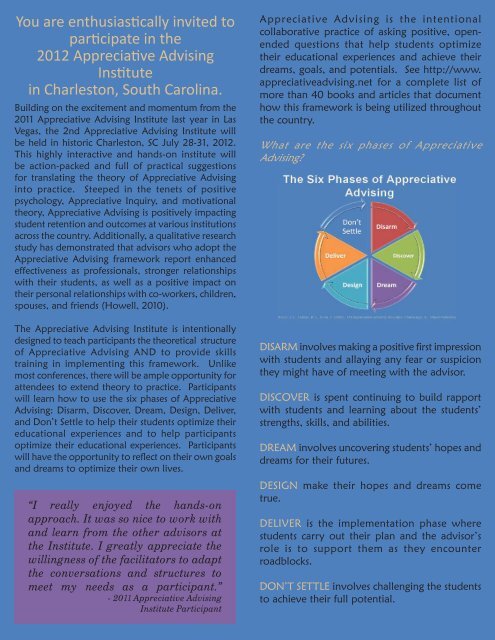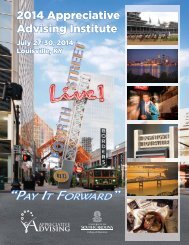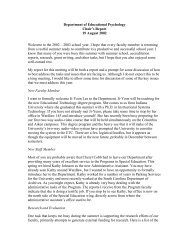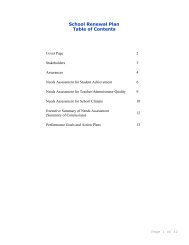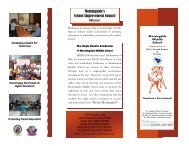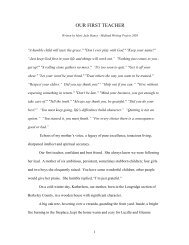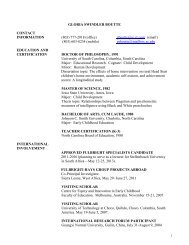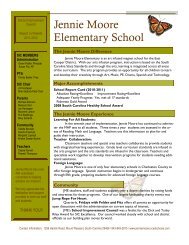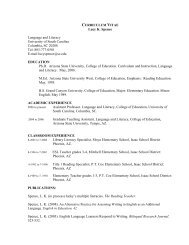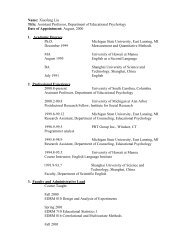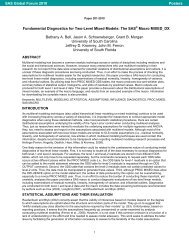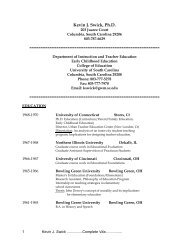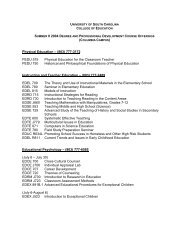2012 Appreciative Advising Institute - College of Education ...
2012 Appreciative Advising Institute - College of Education ...
2012 Appreciative Advising Institute - College of Education ...
You also want an ePaper? Increase the reach of your titles
YUMPU automatically turns print PDFs into web optimized ePapers that Google loves.
You are enthusias cally invited to<br />
par cipate in the<br />
<strong>2012</strong> Apprecia ve <strong>Advising</strong><br />
Ins tute<br />
in Charleston, South Carolina.<br />
Building on the excitement and momentum from the<br />
2011 <strong>Appreciative</strong> <strong>Advising</strong> <strong>Institute</strong> last year in Las<br />
Vegas, the 2nd <strong>Appreciative</strong> <strong>Advising</strong> <strong>Institute</strong> will<br />
be held in historic Charleston, SC July 28-31, <strong>2012</strong>.<br />
This highly interactive and hands-on institute will<br />
be action-packed and full <strong>of</strong> practical suggestions<br />
for translating the theory <strong>of</strong> <strong>Appreciative</strong> <strong>Advising</strong><br />
into practice. Steeped in the tenets <strong>of</strong> positive<br />
psychology, <strong>Appreciative</strong> Inquiry, and motivational<br />
theory, <strong>Appreciative</strong> <strong>Advising</strong> is positively impacting<br />
student retention and outcomes at various institutions<br />
across the country. Additionally, a qualitative research<br />
study has demonstrated that advisors who adopt the<br />
<strong>Appreciative</strong> <strong>Advising</strong> framework report enhanced<br />
effectiveness as pr<strong>of</strong>essionals, stronger relationships<br />
with their students, as well as a positive impact on<br />
their personal relationships with co-workers, children,<br />
spouses, and friends (Howell, 2010).<br />
The <strong>Appreciative</strong> <strong>Advising</strong> <strong>Institute</strong> is intentionally<br />
designed to teach participants the theoretical structure<br />
<strong>of</strong> <strong>Appreciative</strong> <strong>Advising</strong> AND to provide skills<br />
training in implementing this framework. Unlike<br />
most conferences, there will be ample opportunity for<br />
attendees to extend theory to practice. Participants<br />
will learn how to use the six phases <strong>of</strong> <strong>Appreciative</strong><br />
<strong>Advising</strong>: Disarm, Discover, Dream, Design, Deliver,<br />
and Don’t Settle to help their students optimize their<br />
educational experiences and to help participants<br />
optimize their educational experiences. Participants<br />
will have the opportunity to reflect on their own goals<br />
and dreams to optimize their own lives.<br />
“I really enjoyed the hands-on<br />
approach. It was so nice to work with<br />
and learn from the other advisors at<br />
the <strong>Institute</strong>. I greatly appreciate the<br />
willingness <strong>of</strong> the facilitators to adapt<br />
the conversations and structures to<br />
meet my needs as a participant.”<br />
- 2011 <strong>Appreciative</strong> <strong>Advising</strong><br />
What is <strong>Appreciative</strong> <strong>Advising</strong>?<br />
<strong>Institute</strong> Participant<br />
<strong>Appreciative</strong> <strong>Advising</strong> is the intentional<br />
collaborative practice <strong>of</strong> asking positive, openended<br />
questions that help students optimize<br />
their educational experiences and achieve their<br />
dreams, goals, and potentials. See http://www.<br />
appreciativeadvising.net for a complete list <strong>of</strong><br />
more than 40 books and articles that document<br />
how this framework is being utilized throughout<br />
the country.<br />
What are the six phases <strong>of</strong> <strong>Appreciative</strong><br />
<strong>Advising</strong>?<br />
DISARM involves making a positive first impression<br />
with students and allaying any fear or suspicion<br />
they might have <strong>of</strong> meeting with the advisor.<br />
DISCOVER is spent continuing to build rapport<br />
with students and learning about the students’<br />
strengths, skills, and abilities.<br />
DREAM involves uncovering students’ hopes and<br />
dreams for their futures.<br />
DESIGN make their hopes and dreams come<br />
true.<br />
DELIVER is the implementation phase where<br />
students carry out their plan and the advisor’s<br />
role is to support them as they encounter<br />
roadblocks.<br />
DON’T SETTLE involves challenging the students<br />
to achieve their full potential.


